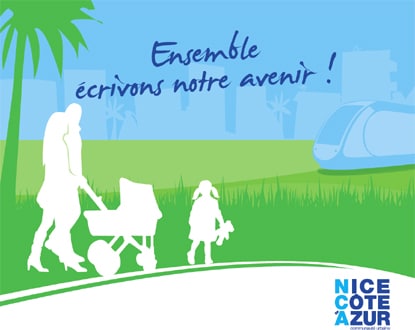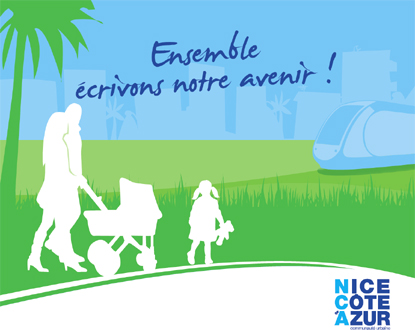What is an Agenda 21? Launched following the Rio conference in 1992, the concept of Agenda 21 meant “an agenda for the 21st century,” that is, “what needs to be done for the 21st century.”
It is a voluntary approach in a territory, a program of actions carried out in favor of sustainable development over a period of 5 years, which takes into account the three dimensions of sustainable development: economy, social, and environment, while also including the governance aspect.
 An Agenda 21 must thus respond to the rapid evolution of challenges posed by sustainable development. In the case of Nice Côte d’Azur, this ambition is complemented by the implementation of new competences gained following the transformation of the community of agglomeration into an urban community.
An Agenda 21 must thus respond to the rapid evolution of challenges posed by sustainable development. In the case of Nice Côte d’Azur, this ambition is complemented by the implementation of new competences gained following the transformation of the community of agglomeration into an urban community.
Nice Côte d’Azur’s Agenda 21
Nice Côte d’Azur’s Agenda is the first second-generation inter-community agenda in France whose actions are carried out both by Nice Côte d’Azur and the member municipalities, which remain responsible for implementing actions in their territory but benefit from a community synergy.
Thus, fifteen actions are carried out by the municipalities, and thirty-five actions are carried out by Nice Côte d’Azur.
It consists of an identified strategy and a plan of 50 concrete actions for the period 2011-2016, covering the three segments: Economic, Social, and Environmental. It serves as the guiding principle of NCA’s sustainable development initiatives, bringing together all its major projects and representative actions in coherence with already established sectoral public policies (PLH, PDU, …). It thus responds to regulatory developments, notably Grenelle environment laws.
The action plan of the new Agenda 21 will meet territorial challenges and global issues, including those concerning the reduction of greenhouse gas emissions.
Indeed, the new carbon assessment recently conducted by Nice Côte d’Azur shows not only the progress made in recent years (2006-2011) but also that it is essential to go further and intensify the actions.
Numerous partners have been involved in this initiative and have positioned themselves alongside Nice Côte d’Azur and the member municipalities to confirm their technical and/or financial partnerships to support the realization of Agenda 21: The General Council, The Regional Council, Institutional bodies (State, ADEME, the University of Nice Sophia-Antipolis,…), Socio-economic actors (consular chambers, competitiveness clusters, private companies such as Veolia, ERDF, GRDF, professional unions such as the hotel association, the Development Council,…) and the associative world, for example: Azzura Lights, Marine World Discovery Center, the network of Associations for the maintenance of peasant agriculture, Agribio…
Transparency, proximity, and continuous improvement for its implementation from 2011-2016
Transparency: all actors, partners, carriers, and the general public will continue to be involved in the implementation of actions (working groups) and the annual assessment (1st semester of each year between 2012 and 2016); the NCA website and semi-annual newsletters will report on the progress of actions.
Proximity: all residents are invited to participate in certain Agenda 21 actions (participatory events), promote their own initiatives (in the periodic Agenda 21 newsletter, during the annual Agenda 21 celebration that will be organized each year in the first semester) and follow the progress of the action plan.
Continuous improvement: based on the annual assessments carried out with quantified indicators, modifications can be made to the actions to improve their effectiveness, and new actions can be proposed.
Some examples of actions from the new NCA Agenda 21:
Implementation of Priority Action Zones for AIR: ZAPA: action carried out by NCA
NCA has been selected, along with 7 other voluntary agglomerations, to experiment with the ZAPA. These zones “should be means to revitalize city centers,” according to the Minister of Ecology, Nathalie Kosciusko-Morizet.
In fact, during 2010, ADEME issued a Call for Projects entitled “Feasibility of Priority Action Zones for Air (ZAPA).” This call for projects aims to accompany and finance a feasibility study of various experimental actions to reduce air pollution in targeted areas. Among these actions, it notably involves banning, under specific regulatory conditions, certain categories of the most polluting vehicles in well-defined zones. These zones, still to be determined, will be subject to a feasibility study starting at the end of 2011, to practically implement the experiment in 2012.
Structuring a meal offer based on organic and local products in school canteens – action carried out by the municipalities.
Nice will set up a central kitchen, which will help develop the local economy and thus reduce the carbon impact of the school canteen activity. The aim is to achieve a pooling of product order markets and promote organic and/or local products for the canteens. The SIVOM Val de Banquière has issued group calls for tenders for the school canteens of its member municipalities, significantly increasing the share of organic products in meals.
Development of the noise observatory: Nice Côte d’Azur Award winner of the Call for Expression of Interest – action carried out by NCA.
Nice Côte d’Azur has been a laureate for a few weeks of the Call for Expression of Interest concerning the development of noise observatories, led by the Ministry of the Environment and ADEME, and covering agglomerations of more than 100,000 inhabitants. It aims to develop from 2011 a network of noise measurement devices, both fixed and mobile, to support the implementation and control of actions under the Environmental Noise Prevention Plan approved in May 2010 by NCA, then the first community in France to adopt such a plan.
“Biodiversity” program – action carried out by NCA.
The annual program of actions in favor of biodiversity began with an awareness operation on the disappearance of bats, including the distribution of bat boxes at the House of the Environment. These actions are carried out in partnership with naturalist experts such as the League for the Protection of Birds (LPO) or the Marine World Discovery Center (CDMM).
Assises Jeunes Méditerranée and the Bay Contract – action carried out by NCA and the municipalities.
Nice Côte d’Azur supports the Assises Jeunes Méditerranée organized by the Marine World Discovery Center, which welcomes school delegations from peri-Mediterranean countries on the theme of coastal management. Nice Côte d’Azur, as the lead structure of the Bay of Azur contract, a coastal zone management tool, supports this approach and will participate in the “Med’olympiades” jury and animate a workshop on the theme of a “Junior” Bay Contract, where it will particularly explain the inter-community prevention and fight against accidental hydrocarbon pollution.
Insertion actions within the framework of major construction projects
community and municipal works – action carried out by NCA
As part of its Local Plan for Integration through Employment (PLIE), Nice Côte d’Azur will develop all inclusion operations combining training and operational implementation, through Professional Integration Contracts by Temporary Work and through insertion projects on major projects (Nice stadium, the tramway extension, etc.).
Realizing an innovative business reception center – action carried out by NCA
Economic structures driving innovation are being created on the Eco Valley and EcoCity Plaine du Var territories, to foster a research dynamic and international visibility (Mediterranean Institute for Risks and Sustainable Development, Promising University Campus, etc.). It aims to complement them by setting up an innovative business reception center in the EcoCity Plaine du Var, which will be labeled at the European level as a “European Business and Innovation Center.”
Developing Auto Bleue: a self-service electric car-sharing system – action carried out by NCA.
Nice is one of the 12 cities that signed the Green Book for the development of charging infrastructure for electric vehicles in the city and the establishment of the “electric vehicle car-sharing” system. Regarding car-sharing, it aims to set up an innovative and environmentally friendly car-sharing system of electric vehicles available to the general public and professionals. These vehicles will be available for reservation 24/7, for short-term use, through a website or call center. It is planned to eventually have 200 electric vehicles on the NCA territory based on 70 stations in the most densely urbanized area. A typical station will have three slots dedicated to car-sharing vehicles and two available slots for individuals to recharge their own electric vehicles.
Improving Centralized Technical Management – action carried out by the communities
The Technical Management of Buildings (GTB) is based on a network of low-cost sensors placed on all the technical equipment of the buildings. They allow real-time monitoring of energy consumption and immediate detection of deviations. These GTB systems generally lead to energy savings that can reach 20%. Currently, the City of Nice is equipping 2 pilot sites: the Diacosmie and the Comte de Falicon pool to display in real-time the relevance and efficiency of an energy and technical management system for buildings.
Creating synergy and pooling reflections around common issues: action carried out by the municipalities and supported by NCA
At the request of the municipalities, working groups will be set up chaired by NCA bringing together the municipalities to share experiences of the different municipalities and delve into reflections on identified issues such as controlled burning, community gardens, smart irrigation management for green spaces. This is to allow maximum synergy and optimize the means for implementing concrete actions of interest to several municipalities.
Inter-generational projects: action carried out by the municipalities
Inter-generational projects are underway and will be developed, with for example multi-care structures or initiatives creating links. The example of the “La Fraternelle” home-nursery in Cagnes-sur-Mer can be cited, which integrates a nursery and an elderly home in its premises; it offers a complete partnership between elderly people and children who participate in meetings, gardening activities, cooking, outings, and celebrations to promote the notion of sharing and links between generations. The association “Friends of Reading and Make Reading” of Nice also encourages all civic initiatives aimed at promoting and developing the love of reading through volunteers who are retired or at least fifty years old, especially working with children.



